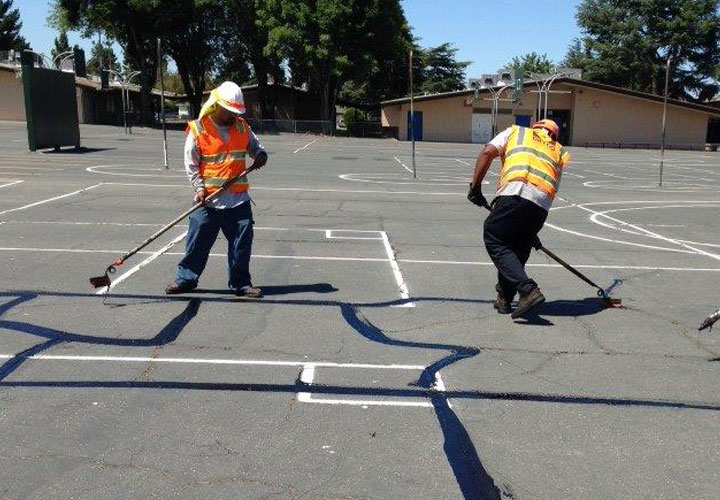Make The Most Of Safety with Angle Parking Lot: Superior Asphalt Sealing
Wiki Article
Cold Mix Asphalt Vs. Hot Mix Asphalt: Which Is Right for You?

Composition Distinctions
Cold mix and hot mix asphalts differ substantially in their composition, with unique qualities that influence their performance and applications. Cold mix asphalt is generated by emulsifying the asphalt binder with water and an emulsifying representative prior to mixing it with accumulation. This approach enables the asphalt to be workable at lower temperature levels, making it perfect for short-term repair services and for use in colder climate condition. Hot mix asphalt, on the various other hand, is made at heats, commonly in between 300-350 ° F, which aids to accomplish far better compaction and an extra resilient last product. The hot mix asphalt manufacturing procedure includes warming the aggregate and asphalt binder separately prior to incorporating them at the asphalt plant.
Moreover, cool mix asphalt has a tendency to be much less dense and extra versatile than hot mix asphalt. This adaptability makes it better matched for areas with greater degrees of movement, such as driveways or roads with heavy web traffic. On the other hand, hot mix asphalt is recognized for its high durability and resistance to rutting and fracturing, making it a favored choice for highways and high-traffic roads where long life is important.
Installment Process Differences
The process of installing cool mix and hot mix asphalt shows noteworthy variances in their procedures and needs. In comparison, warm mix asphalt necessitates a more sophisticated installment procedure. Due to the heating requirements, hot mix asphalt setups are generally lugged out by specialists with specialized devices, making certain a more irreversible and structurally sound outcome.Toughness and Longevity Elements
When considering asphalt options, longevity and durability are vital factors to evaluate for lasting pavement efficiency. Warm mix asphalt (HMA) is understood for its exceptional longevity and durability. The high temperature levels throughout the laying and mixing process enable far better compaction, leading to a denser and stronger sidewalk framework. This causes HMA being extra resistant to rush hour lots, extreme weather problems, and the effects of maturing contrasted to cold mix asphalt (CMA)
In regards to durability, HMA normally exceeds CMA due to its remarkable strength and resistance properties. HMA pavements have a longer solution life, needing much less frequent repair services and upkeep, which can equate to cost financial savings over time. In addition, HMA pavements are a lot more quickly personalized to meet certain task needs, further improving their sturdiness.
Price Considerations
Thinking about the monetary implications is a vital aspect when evaluating the option in between warm mix asphalt (HMA) and cold mix asphalt (CMA) for pavement jobs. While the preliminary expense of warm mix asphalt is commonly greater than that of chilly mix asphalt, HMA frequently offers an extra cost-effective remedy over time due to its exceptional resilience and long life. HMA is known for its capability to endure heavy website traffic loads and severe weather, reducing the demand for regular repair services and maintenance. On the various other hand, cold mix asphalt is more budget-friendly upfront but may need more frequent patching and resurfacing, bring about greater upkeep costs in time.In enhancement to material costs, it's necessary to take into consideration the expenditures linked with installment and maintenance when comparing HMA and CMA. Ultimately, the choice between HMA and CMA should take into account not just the first cost but also the long-term monetary ramifications to establish the most cost-efficient option for the certain pavement job.
Environmental Effect Contrast
Comparison of the environmental influences between hot mix asphalt (HMA) and cold mix asphalt (CMA) exposes distinctive differences in sustainability techniques. HMA production calls for heats, leading to raised energy usage and greenhouse gas emissions. The process also releases unstable organic compounds (VOCs) and unsafe air toxins (HAPs) into the environment. In contrast, CMA is generated and used at reduced temperatures, decreasing energy use and emissions dramatically. The reduced manufacturing temperature levels of CMA result in lowered gas consumption and reduced levels of CO2 discharges, making it an extra eco-friendly choice.Furthermore, using CMA usually entails recycling existing asphalt pavement, advertising source preservation and minimizing the amount of waste sent out to land fills. This reusing aspect better improves the sustainability of CMA contrasted to HMA. On the whole, when taking into consideration the ecological impact, CMA becomes a much more ecologically sustainable choice as a result of its lower power needs, minimized exhausts, and the capacity for recycling existing products. By deciding for CMA over HMA, road building projects can contribute favorably to environmental preservation efforts.
Verdict
To conclude, the choice between cool mix asphalt (CMA) and warm mix asphalt (HMA) depends upon various factors such as structure, setup procedure, longevity, durability, price, and ecological influence. asphalt repair. While CMA offers a quick and cost-effective option for small fixings, HMA makes certain premium resilience and longevity for rush hour areas. Consider these variables thoroughly to identify which kind of asphalt is the right option for your paving requires

Considering the financial effects is an important facet when examining the choice in between warm mix asphalt (HMA) and cold mix asphalt (CMA) for pavement jobs. While the first price of hot mix asphalt is usually greater than that of cold mix asphalt, HMA usually offers an extra cost-effective solution in the lengthy run due to its premium toughness and durability. asphalt patch repair.Contrast of the environmental influences in between hot mix asphalt (HMA) and chilly mix asphalt (CMA) discloses unique distinctions in sustainability techniques.In verdict, the selection between cold mix asphalt (CMA) and warm mix asphalt (HMA) depends on numerous elements such cold mix asphalt as structure, setup process, durability, longevity, cost, and ecological effect
Report this wiki page